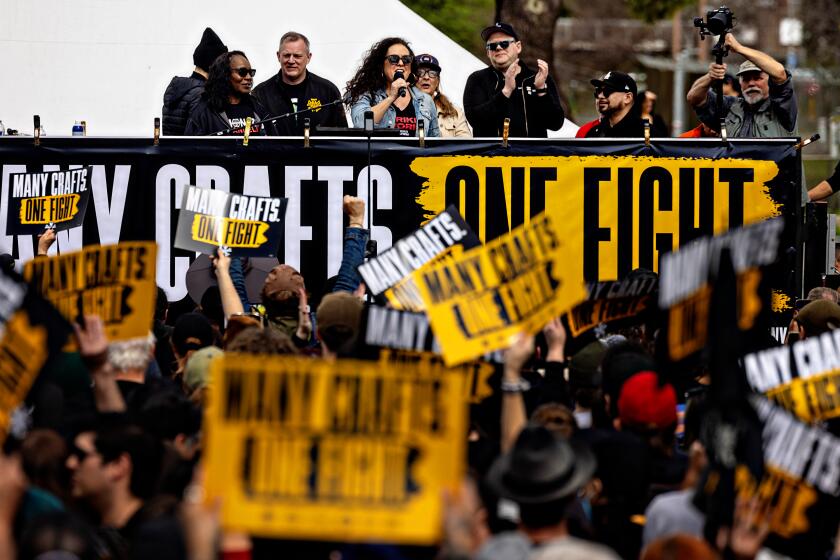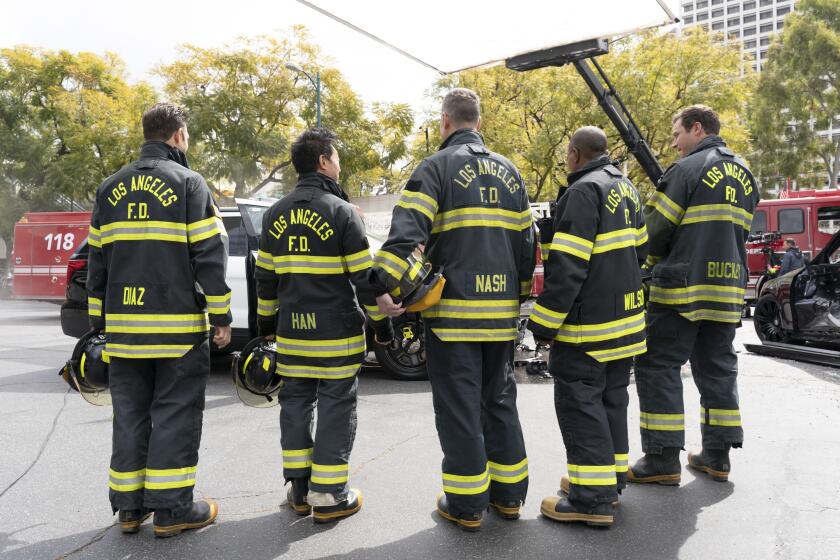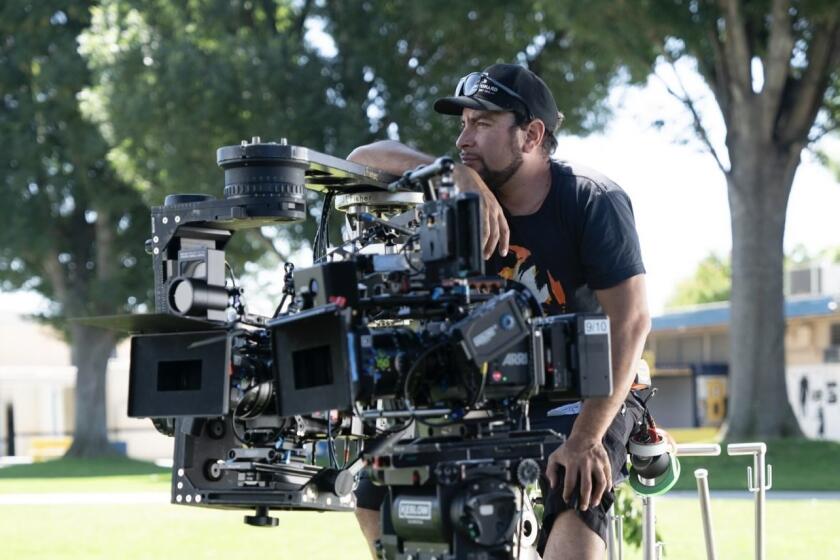What’s in the new IATSE deal? Wage increases, AI rules and more

- Share via
The crew members union IATSE released a summary over the weekend of its new tentative agreement with the top Hollywood studios, including terms related to pay, pension and health benefits, working conditions, streaming residuals and artificial intelligence.
The International Alliance of Theatrical Stage Employees and the Alliance of Motion Picture and Television Producers arrived at a resolution Tuesday on the Hollywood Basic Agreement, which spans three years and covers some 50,000 craftspeople primarily based in the Los Angeles area.
In a memo to members, the union said it would release an abridged version of the deal, followed by a full copy of the document that workers can review before participating in a contract ratification vote.
IATSE, the union advocating for Hollywood crew members, and the AMPTP, which represents the top studios, have reached a tentative agreement on a new three-year contract.
Here’s a summary of the seven-page summary (which can be viewed here in its entirety).
Pay
The deal contains wage increases of 7%, 4% and 3.5% spaced out over the three-year term.
It also stipulates that hourly workers are entitled to triple pay whenever a workday exceeds 15 hours and that on-call employees qualify for double pay on the seventh consecutive workday.
Both of these overtime provisions are part of an effort by the union to discourage employers from requiring crew members to spend an excessive number of hours on set. Below-the-line workers have long complained about marathon shooting schedules sometimes exceeding 12, 14 or even 20 hours in a day.
The International Alliance of Theatrical Stage Employees (IATSE) is scheduled to enter general contract negotiations with the Hollywood studios this week.
This issue received extra attention after the death of studio grip Rico Priem, who suffered cardiac dysfunction while driving home at 4:30 a.m. on a Saturday after working back-to-back,14-hour overnight shifts. When Priem died, IATSE and the AMPTP paused their negotiations, and the union put out a statement declaring its “renewed commitment” to improving crew members’ working conditions.
In the same vein, employers would be required to pay double time when rest or meal periods are skipped.
Other gains in this area include a travel allowance for those required to work outside a certain radius and a bump in severance pay.
Artificial intelligence
The deal mandates that “no employee is required to provide AI prompts in any manner that would result in the displacement of any covered employee,” according to a memo issued Tuesday by the union.
Establishing AI regulations has become a top priority for the entertainment unions in recent years as anxiety about the technology encroaching on creatives’ jobs has intensified.
Any time employers plan to implement AI behind the scenes, they would be required to negotiate with the union how the technology might affect crew members working on the production, with “very limited exceptions.”
Crew members who voluntarily use their own AI programs as a tool in their work (employer permitting) would be entitled to a negotiable “kit rental fee” for their technological contributions to a project.
IATSE and Teamsters, two unions representing Hollywood crew members, are entering contract negotiations with the studios after the writers’ and actors’ strikes.
Once the contract is ratified, a committee would be formed to create AI training programs educating craftspeople on how to use the technology.
The agreement also states that employers must obtain consent from individual crew members before scanning them for AI purposes. Notably, consent forms must include language clarifying that “signing is not a condition of employment” — an added layer of protection that was controversially absent from the actors’ new contract with the AMPTP.
As technology evolves, the union would have the option to request quarterly and biannual meetings with entertainment companies to revisit AI guidelines throughout the course of the contract.
Pension and health benefits
The union was able to secure more than $700 million for its pension and health plans, funded in part by payments from employers, travel-only days and an updated streaming residual system.
The deal further ensures that covered workers will have uninterrupted access to health and pension services for the remainder of the plan year. Additionally, those who recorded at least 65 hours of work last year will receive a year’s worth of credit toward their pension plan to “account for the reduction in employment in 2023.”
A longtime and beloved studio grip died early Saturday in a car accident after pulling a 14-hour overnight shift on the TV series ‘9-1-1.’
Looking forward to the future, the deal states that crew members’ contingent pension benefit will increase to 15% from 10% at the start of 2027. At the same time and rate, a bonus contribution will be made retroactively to cover the period from 2024 to 2027.
As for the health plan, studios are required under the new deal to contribute an added amount of at least $1.09 for each hour worked or guaranteed in the first year of the agreement. Extra payments apply to companies that meet certain qualifications in the second and third years of the term.
The deal also recommends that trustees of the motion picture industry pensions and health plans launch a 401(k) plan funded by voluntary contributions from workers.
While the new contract is in effect, healthcare coverage costs, benefits and prescription drug co-payments will remain fixed for members and their dependents.
Streaming residuals
A variety of streaming residuals have been created as part of the contract to help fund the union’s pension and health plans.
Collectively, the residuals cover programs that play on streaming services, TV and basic cable.
2023’s dual strikes by writers and actors created a dry spell for everyone in Hollywood. Crew members are still feeling the aftershocks.
Bonus pension residuals will also be distributed depending on how well shows perform on their respective streaming platforms.
Working conditions
As part of the effort to prevent accidents involving crew members driving home late, call sheets would now include contact information for the person coordinating rides and rooms for workers.
Producers would also be required to purchase upfront and reserve temporary lodging for employees for the entirety of their post-work rest period or until they are needed back on set. Additionally, producers would be responsible for providing rides, as well as secure parking for the entirety of an employee’s overnight stay.
The summary does not specify under what conditions — such as consecutive hours worked or distance traveled — the accommodations would apply.
Time off
For the first time in IATSE’s history, the tentative deal recognizes Juneteenth as a holiday, and employees will not be required to work on June 19 starting in 2025.
To account for lost employment opportunities in 2023, only 40 days of work during that period would be needed to qualify for a year’s worth of vacation-time accrual, instead of the standard 100 days.
The contract would also increase the maximum amount of accrued sick days to 10 from six.
More to Read
Inside the business of entertainment
The Wide Shot brings you news, analysis and insights on everything from streaming wars to production — and what it all means for the future.
You may occasionally receive promotional content from the Los Angeles Times.
















